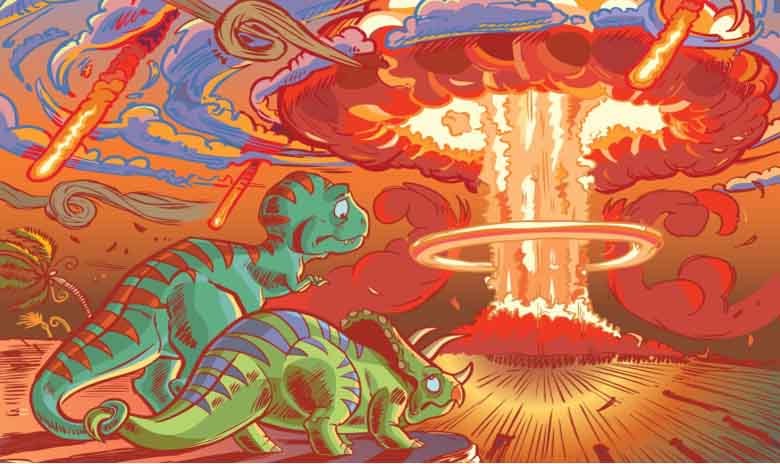THAT Asteroid Only Accelerated Inevitable Dinosaur Extinction
A team of scientists have discovered dinosaurs were on a downturn about 76 million years ago, 10 million years before the asteroid hit Chicxulub in modern Mexico causing the mass extinction of non-avian dinosaurs, about 66 million years ago. The new study published in the journal Nature Communications concludes that the reason for this decline was “global cooling, herbivore loss and dinosaurs' failure to adapt.”

The news study shows that dinosaur extinction rates were increasing 76 million years ago. (Orlando Florin Rosu / Adobe Stock)
Tracking the Dino Decline
The new study demonstrated that six species of dinosaur, including tyrannosaurs, triceratops and hadrosaurs, were all evolving and expanding throughout the Cretaceous period between 145 to 66 million years ago. Then, relatively suddenly, extinction rates increased about 76 million years ago. Furthermore, in this period of great change fewer new species emerged. The scientists made it their quest to find out what exactly caused these rapid evolutionary changes, and the new study was born.
- Studies Begin on a Crater That May Explain the Dinosaur Extinction 65 Million Years Ago
- Dinosaur-dooming Asteroid Struck Earth at 'Deadliest Possible' Angle
Lead author Fabien Condamine, from the University of Montpellier, and coauthor Professor Mike Benton, a professor at the University of Bristol, said their team “explored different kinds of possible causes of the dinosaur decline,” in a Bristol University press release. 1,600 fossils were analyses from six dinosaur families: Ankylosauridae, Ceratopsidae, Hadrosauridae, Dromaeosauridae, Troodontidae and Tyrannosauridae, and a pattern was identified in the extinction of each - climate change.

The decline in herbivorous dinosaurs led to them being outcompeted by hadrosaurs. (Daniel / Adobe Stock)
Hadrosaurs Stepped Up Their Game
The researchers discovered a period of global cooling caused the Earth's temperature fall by 7°C (12.6°F). This led to a rapid reduction in the number of species in the years before the asteroid hit the Earth and wiped out non-avian dinosaurs about 66 million years ago. The loss of herbivores, according to Dr. Benton, “made the ecosystems unstable and prone to extinction cascade.”
Compounding the decline, dinosaur’s had a slow rate of adaption to the new colder environmental conditions, and these two key factors are suggested as having sparked the eventual extinction of all dinosaurs. With overall climates becoming cooler life became much harder for the dinosaurs because they had evolved to survive in warm climates.
The study shows how with the loss of herbivores “longer-lived dinosaur species were more liable to extinction, perhaps reflecting that they could not adapt to the new conditions on Earth.” What then caused this reduction of herbivorous dinosaurs? The paper specifies that it was actually a decline in “the diversity” of herbivores that led to them being outcompeted by hadrosaurs.

The Chicxulub asteroid may have brought about the dinosaur extinction, but the study claims they were already on their way out. (Sean Gladwell / Adobe Stock)
Collapsing Dinosaur Ecosystems
Professor Condamine explained that the six species analyzed were the most abundant dinosaur families through the whole of the Cretaceous, spanning from 150 to 66 million years ago. Around 76 million years ago they suddenly declined, and 10 million years later non-avian dinosaurs were wiped out “and more than half the world's species were obliterated,” according to the paper. This conclusion means that the Chicxulub asteroid that tore into the Earth’s crust in what is now the Gulf of Mexico, ended a life form that was already on the way out while kick-starting the rise of mammals.
- 66-Million-year-old Deathbed Linked to Dinosaur-Annihilating Meteor
- World’s First Complete Dinosaur Skeleton Has Been Vividly Brought to Life
Guillaume Guinot, also of the University of Montpellier, said in all of the models evidence was identified for the decline of dinosaurs occurring before the the impact. So there we have it folks. The next time you hear someone talking about the space rock that evaporated the dinosaurs, say “erm… that’s so 2020. Don’t you know, the dinosaurs were already shaking to bits and were well on the way out by then.” But perhaps the most fascinating take away from this new study is that the same asteroid that “finalized” the departure of the dinosaurs also terraformed Earth and brought about the climates in which we would thrive.
Top image: Dinosaur extinction Source: dolimac / Adobe Stock
By Ashley Cowie




















Comments
When I was child I read books on Dinos that were published before the confirmed Asteriod impact extinction. As I remember it the Dinosaur extinction was described as a gradual process; at least in the books that read. Now I’m wondering how evolution could have been differnent had not the asteriod collision happened. You could assume that mammels would be dominate today but we may have some direct Dinos desendants living on the fringes along with the other of todays reptiles, much smaller of course. Pterosaurs were losing out to the dino-cousins the Birds. Would we still have some desendants of the prehistoric ocean-reptiles? Water Under the Bridge, I guess.